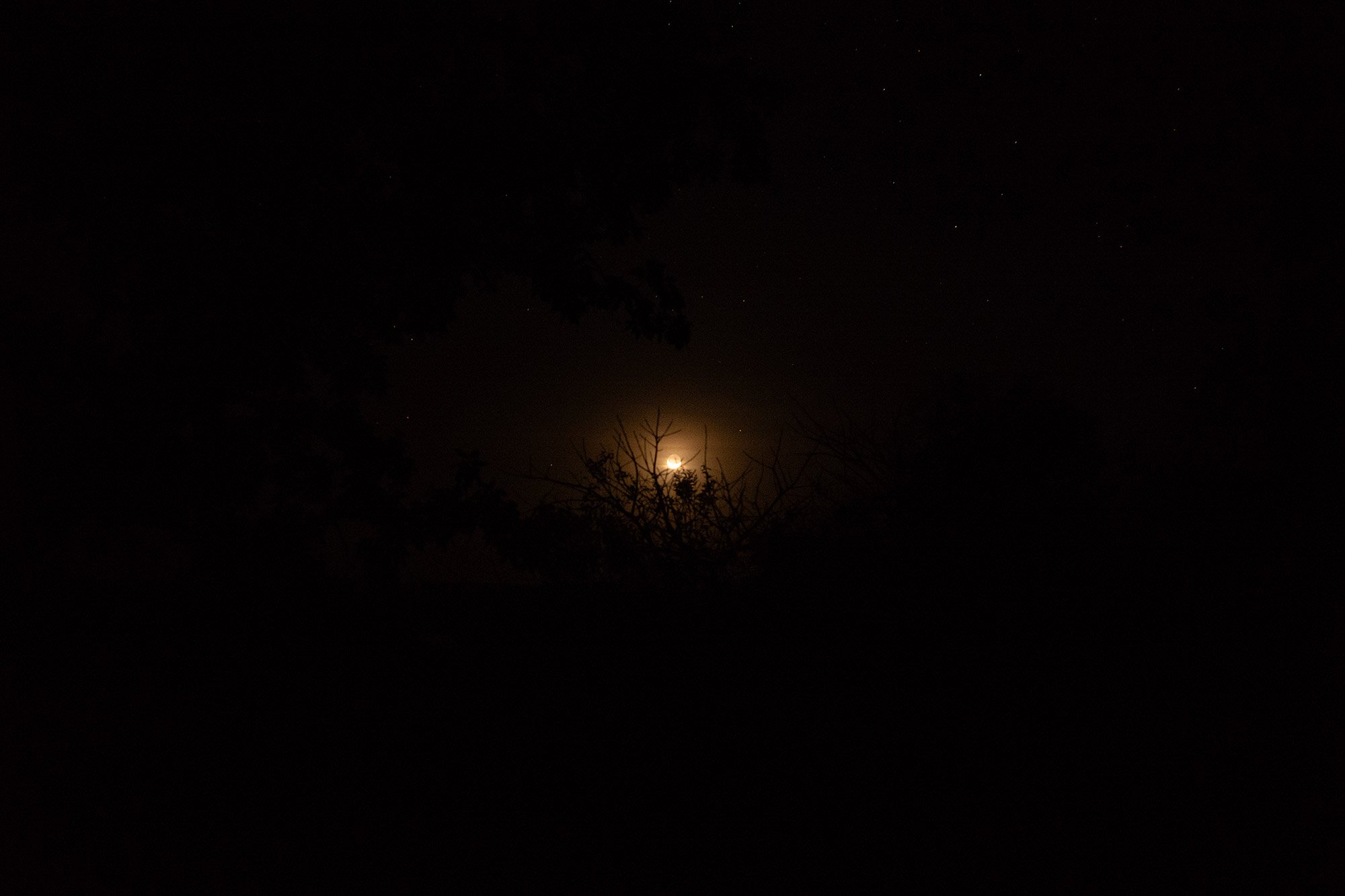
The Gambia chapter two
A Journey to the Chimp Rehabilitation Project on the banks of The Gambia River.
My alarm goes off at 05:15. I’m to meet Ibrahima(2) at 0600 in order to catch the first ferry back across the river.
We’re driving to the Chimp Rehabilitation Center, over two hundred kilometers and almost four hours upriver. We’re approaching from the north side and a boat will meet me at the Kairoh Garden hostel in Kuntaur to take me down and across the river to the center. It’s a bit of an aggressive schedule as the owner of center tells me that the boat will meet me at a certain time and admonishes me not to be late. My local guides are unpreturbed.
It’s predictably dark when we pass back through the Arch and into Banjul. We arrive at the ferry terminal and find spots to sit on stiff wooden benches and wait for the gates to open.

Slowly, the day brightens and anticipation increases. The gates open as the sun begins to rise and we board the ferry under pink skies.
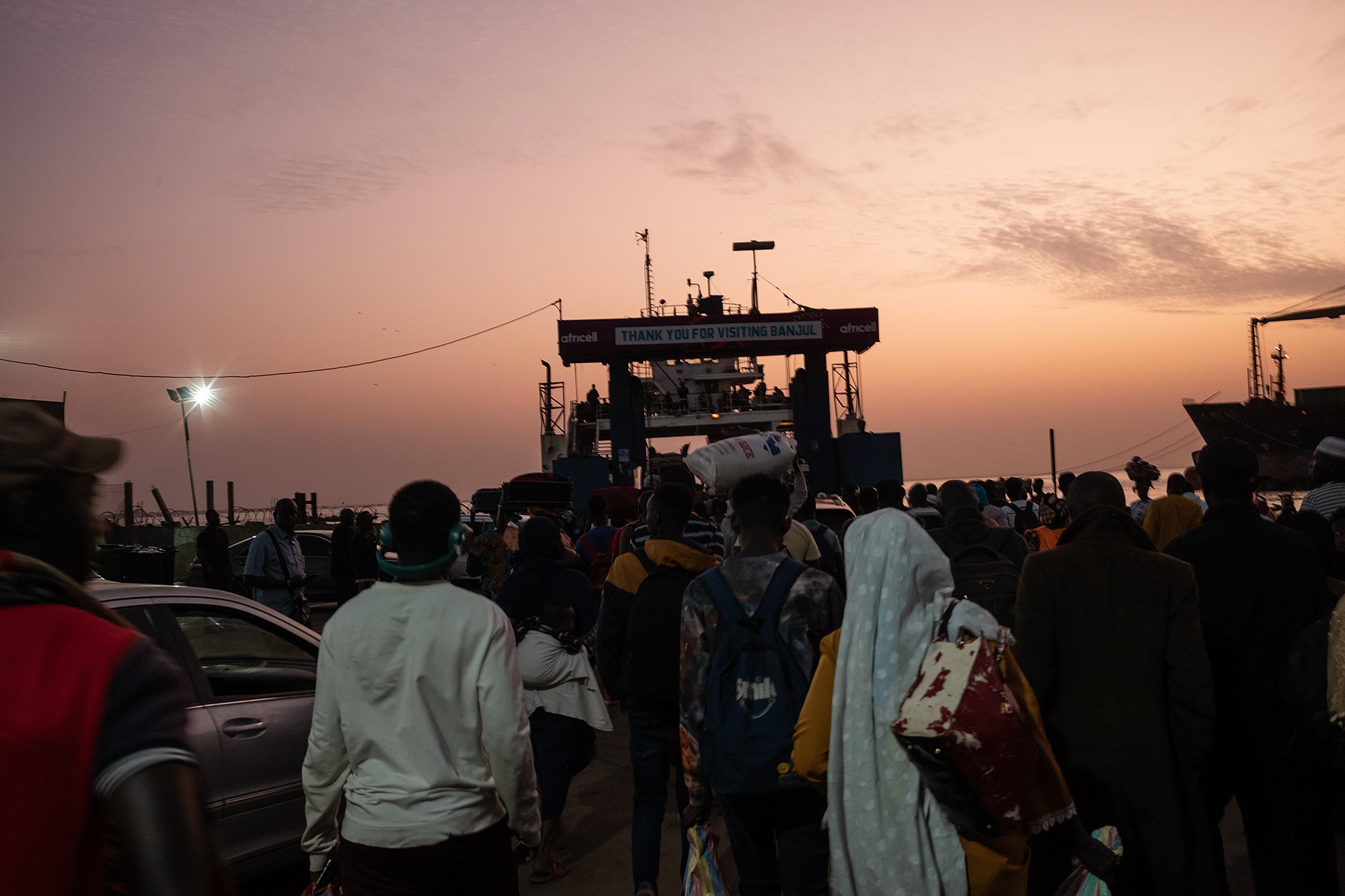

The ferry makes its slow way across the river, the sky lightening as it does. I track our progress against the rising sun, brightening up the east.


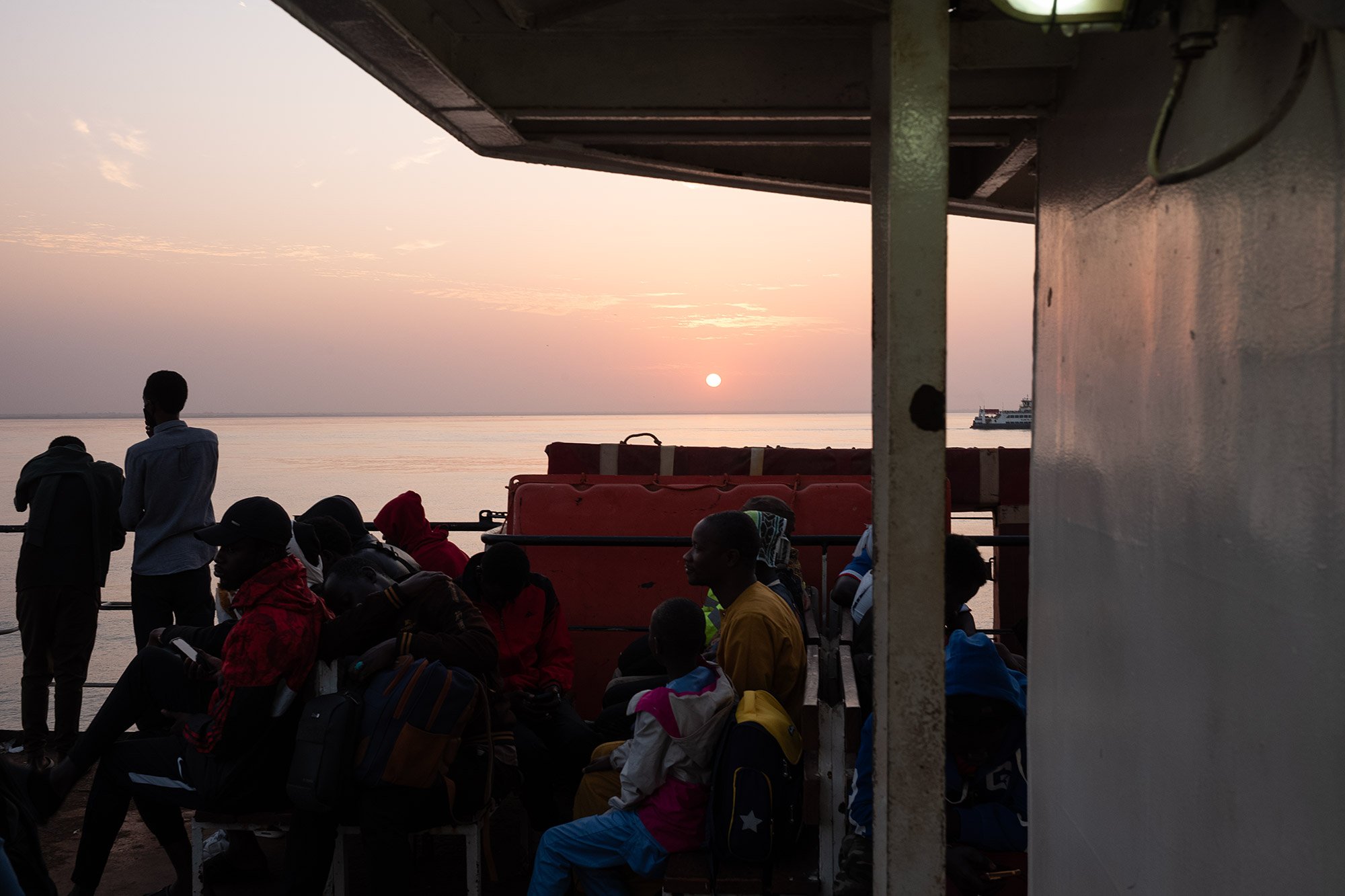
It’s a quiet ride. Most of the passengers seem lost in their own thoughts or on the verge of sleep. The day grows brighter with each cable length we pass.
A woman sells cakes on the boat. Cake cake cake cake cake, she says as she passes. A man buys socks from another seller making his way through the crowd. Another peddler sells flashlights. Lamp lamp lamp lamp lamp.
Mist rises from the banks of the opposite shore. It dissipates slowly as the day warms. As we near people rise and start moving towards the bow, crowding the space between the cars. Ibrahima(2) motions to me and we join the crowds, packed on the stairs leading down to the lower decks.

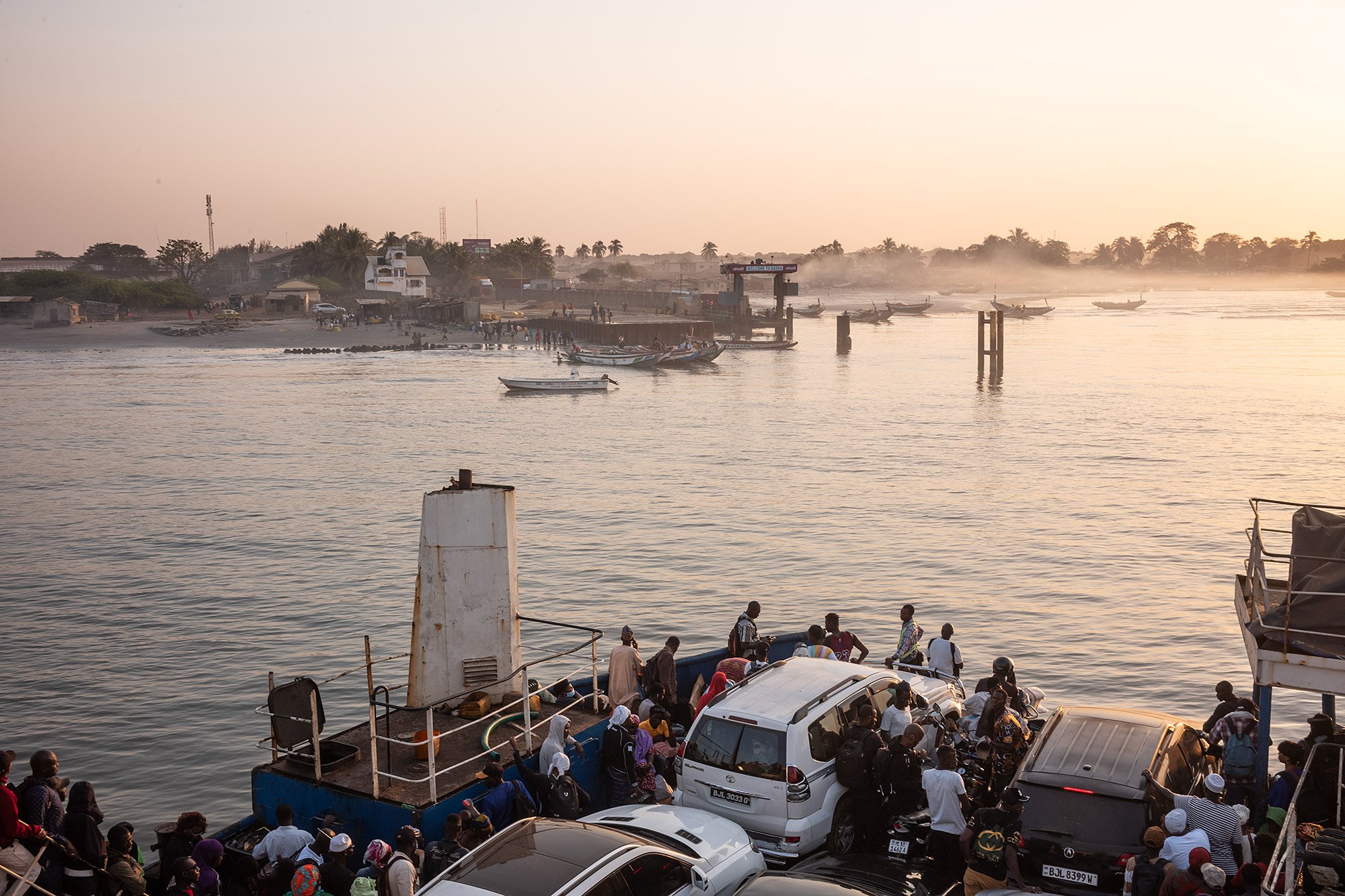
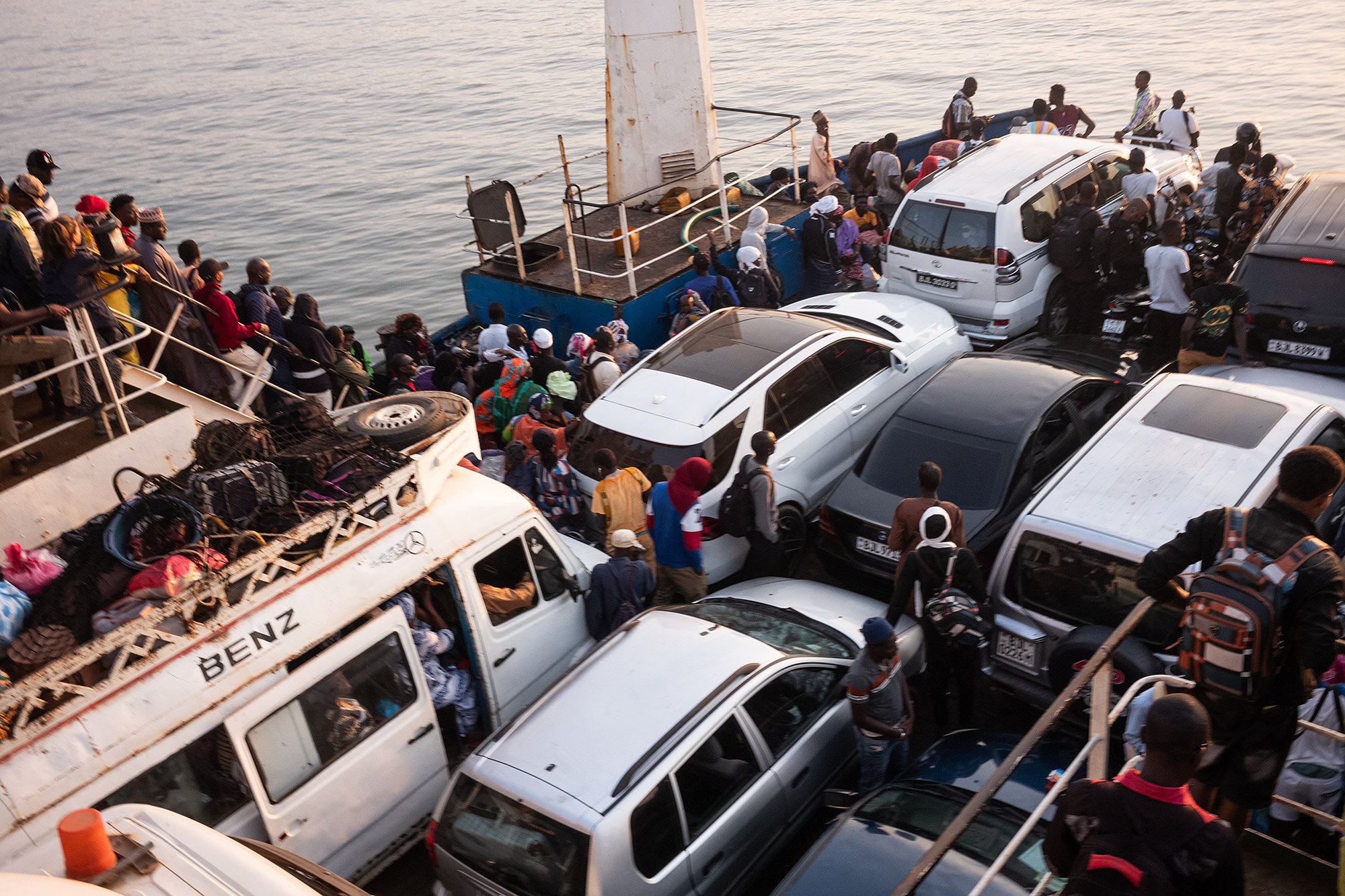
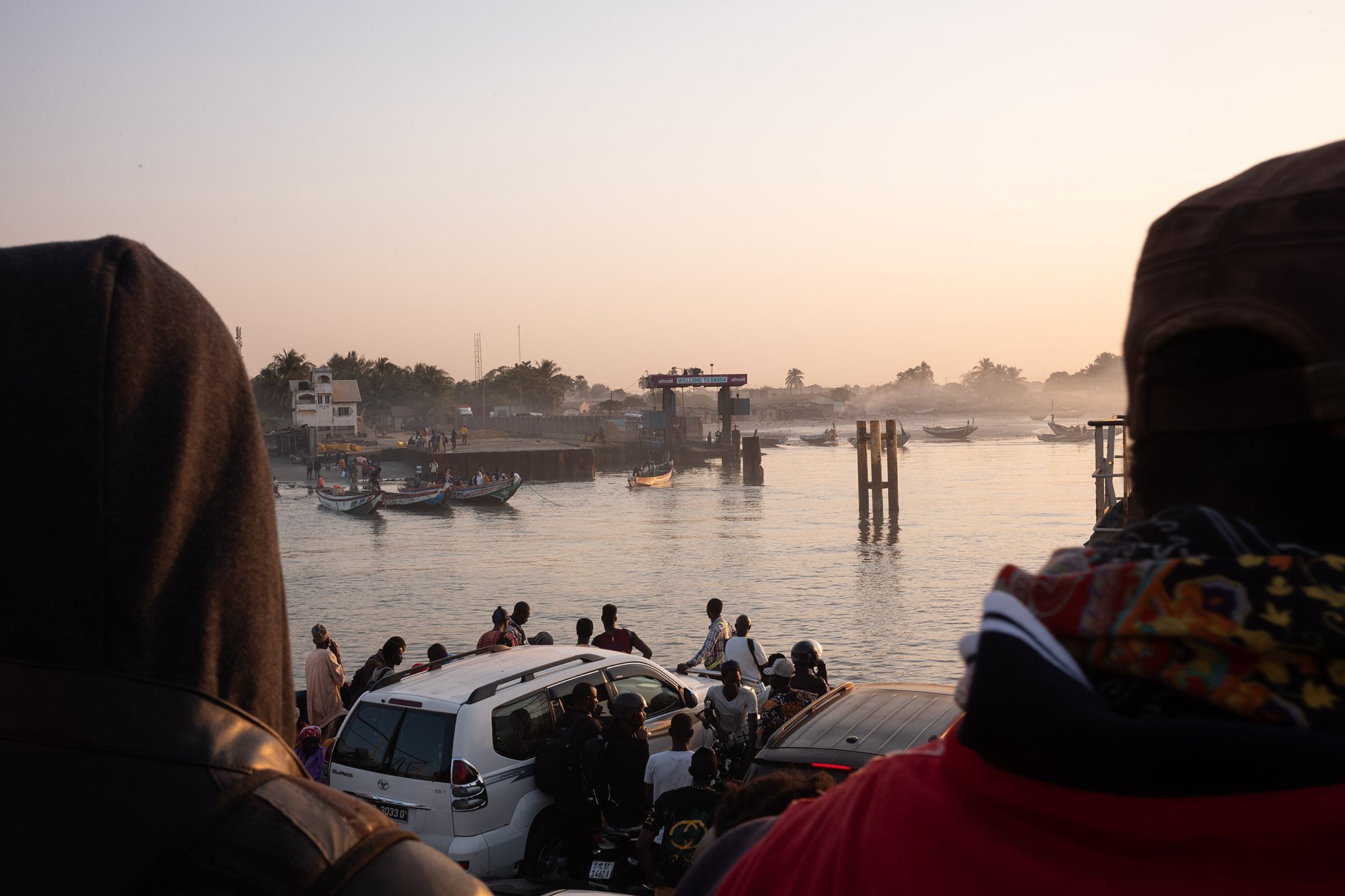

Back on the northern side of the river we walk to the car and find it unblocked. Ibrahima(1) had nightmares that we wouldn’t be able to get the car out from its spot. We help him take the cover off and pack it into the car, then load our bags and ourselves and start heading east.




We pass fields and lakes and villages, our windows cracked to let air into the car. Outside day has warmed up. The sun is strong.


As we head further east we encounter checkpoints. At one point we drive through Farenfenni and Ibrahima(1) tells me we’re only 10-15 minutes from the Senegalese border.
Near our destination we’re stopped one more time. The guard wants to see Ibrahima(1)’s visa. We are nearing the time of my rendezvous. We turn right at a futbol field and head down a dirt road. A herd of cows slows our progress; the cowherd drives them from the road.
When we arrive there’s no boat. We hang out in the guesthouse to wait. The guides are not surprised; they hadn’t expected punctuality. I walk towards the dock and stop to look at lines of fish hung up to dry in the sun.

MJ arrives shortly and proceeds to motor us down the river towards the camp. It’s a wide, flat-bottomed aluminum boat and we glide over the water. As we pass, he points out some chimps in the trees on the island we skirt to get to the camp.
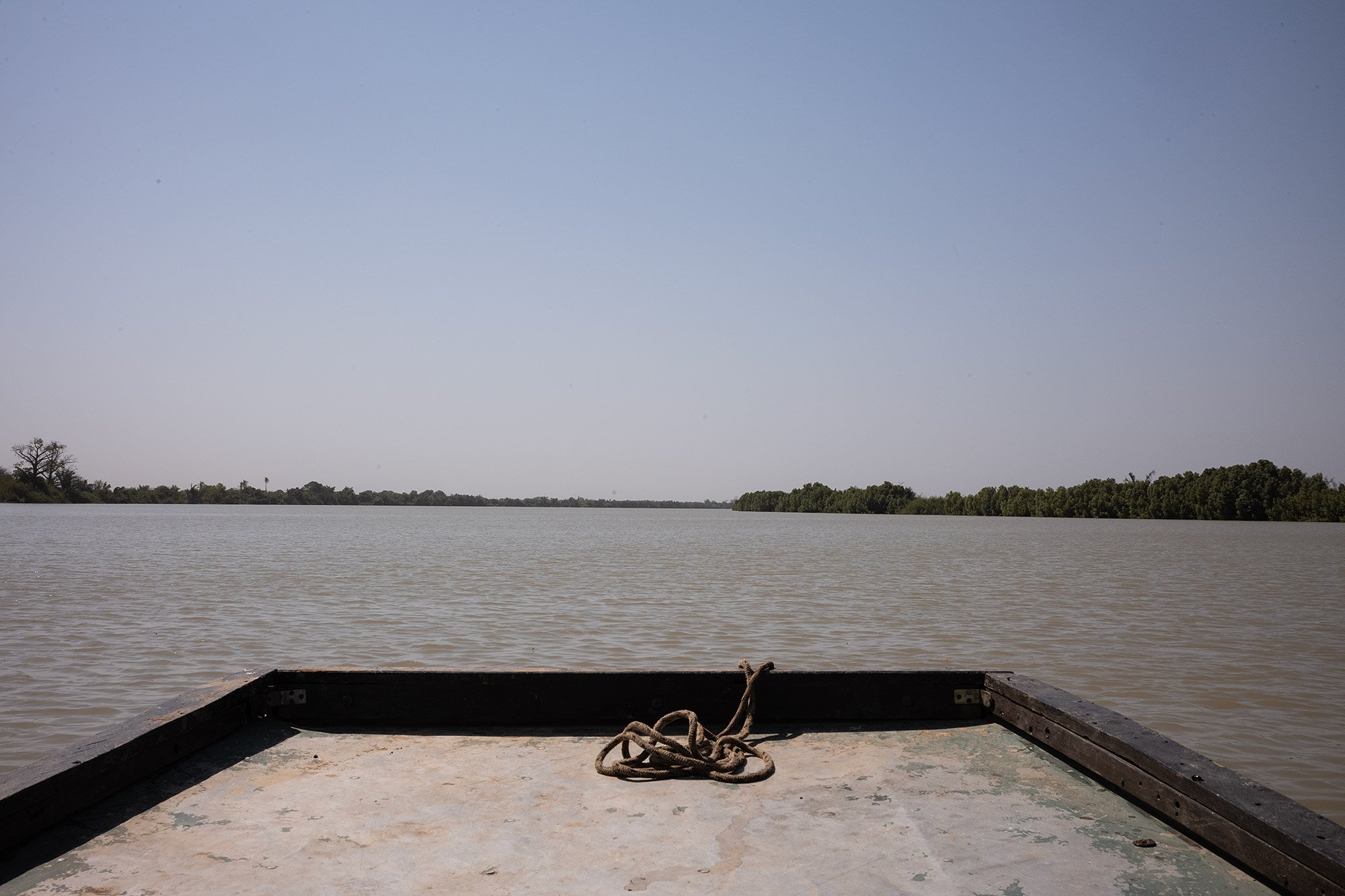

Janis greets me when I arrive. The boat ties up to a set of stairs leading to the main guesthouse. A porch juts out over the water; stairs lead up to a viewing area. Inside there’s a dining table set to one side with a sitting area on the other. The kitchen is located directly next to the dining area; the sitting area backs onto a small bar.
She cofounded the center and has been living in The Gambia for 47 years. She arrived with Lucy, a chimpanzee famous in the 70s for having been brought up in a human family. She had done her post-doc work studying sign language with chimpanzees. She was introduced to Lucy and her family as part of her work and was heavily involved in Lucy’s rehabilitation after it was determined she should be returned to teh wild.
The process of finding a home for her was fraught, leading the family and Janis to The Gambia. They were told a preserve and facilities had been set up; they weren’t quite. Someone had to stay behind to make sure things were done properly and of the four that had accompanied Lucy (her human parents and brother) Janis was the expendable one. She stayed and ended up living on the island with the chimpanzees she rehabilitated for a number of years before moving back to the mainland.
Janis offers me refreshments and then calls for someone to show me to my tent. It’s up on the ridge above the guesthouse and we climb a winding path to get to the top. The bathroom is shared, a compost toilet a short walk from my tent; an outdoor shower is set up on a corner of the platform on which my tent rests. From my platform I have views out over the river.




I return to the main house for lunch. Four people from Holland have arrived; a brother and sister and their spouses. The sister now lives in The Gambia having first come with a project to build schools. Each year they stayed longer and longer and have now bought land and built a compound on the western shores.
After lunch I go outside to sit out on the deck. Janis comes to ask how I am. I couldn’t be better. She’s brought out oranges and hands one to me. She tells me they get them from Morocco. It’s one of the best I’ve ever had.
I ask her where she’s from. She says she guesses she has a bit of an accent and asks me to guess. Oklahoma? Interesting, she says. She went to school there, but shew as born in Hawaii and grew up there.
She tells me she went to school in a Quonset hut. She still has a copy of the newspaper when Hawaii made statehood. They were supposed to be the 49th state and she was disappointed when Alaska was made 49th. They then were 50th. It was the first time a headline was printed in red.
She misses it there. Her father was in the Air Force, stationed in Southeast Asia. Her mother didn’t like to fly, which is how they settled in Hawaii. She wouldn’t mind retiring there, but it’s become so expensive.
I ask her how people find the center. Before covid, it was mostly tours that came through, now it’s mostly independent travelers who find out about her. She wants to preserve the charm of the place and feels like making it a little more difficult to find helps. It also helps that only the truly committed will make their way out here.
I ask her if she’s seen Apocalypse Now. She hasn’t. I mention a scene in the ‘restored’ edition where Charlie Sheen’s character comes across a French family in the jungle, dressed and living as if they’d never left their home and how surreal it is. Arriving from the water and finding the camp so secluded made me think of that scene.
She asks me if I find the place surreal. No, I answer. It’s a jewel.


After lunch a boat picks us up to explore the island. We see chimps and baboons and red colobuses from a distance. We stop to watch chimps, perched on low-hanging branches, reach into the river and drink from cupped hands. In the river we can see hippos, their backs break the surface of the water.


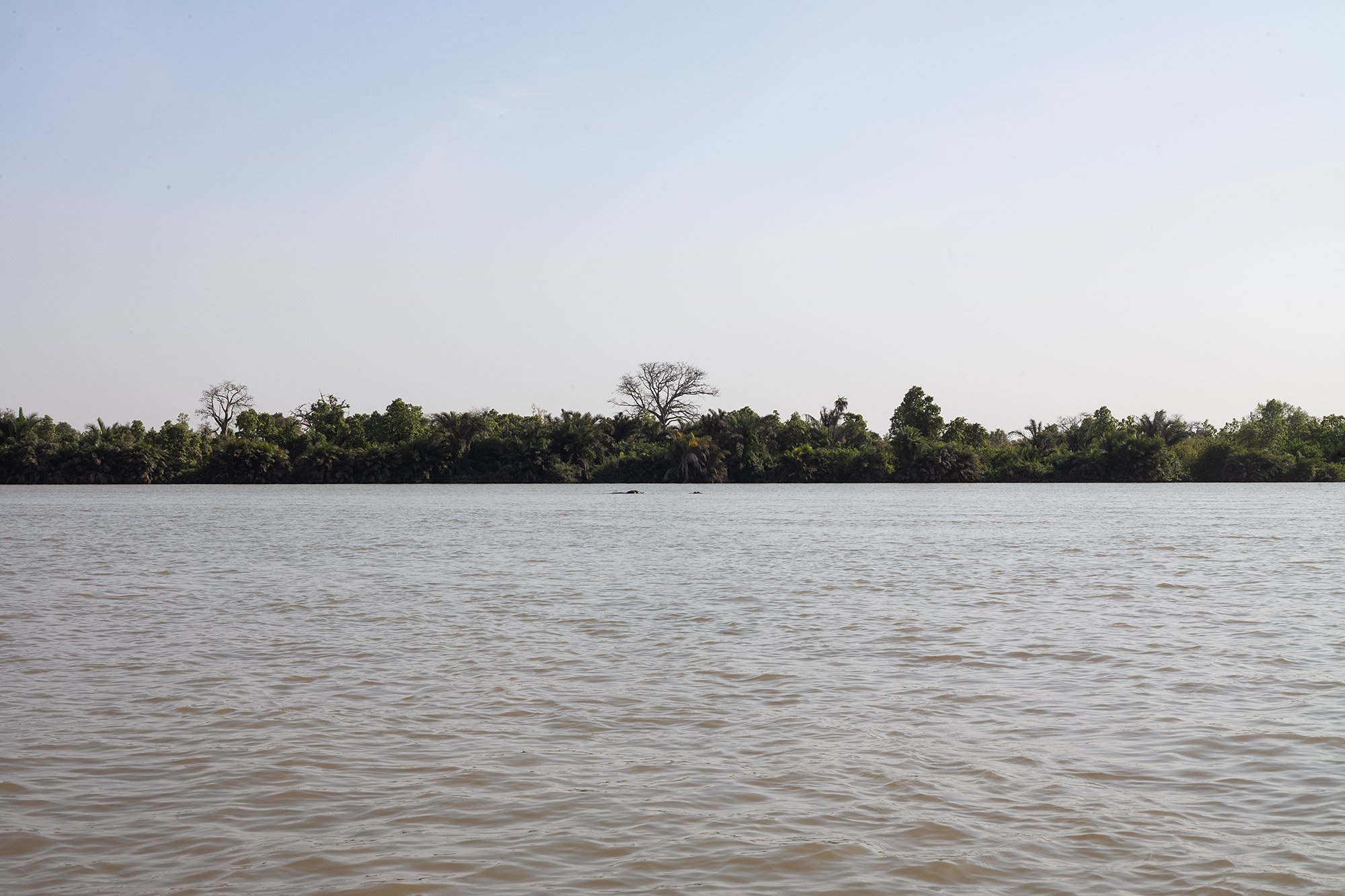

Coming around the island I look towards the shore for the trees, admiring the dense green that lines the banks.

Crocodiles sun themselves on a muddy shore. The boatsman slows the boat and lets us drift close to them. One rises and strolls towards the water, slips under the surface as it swims.



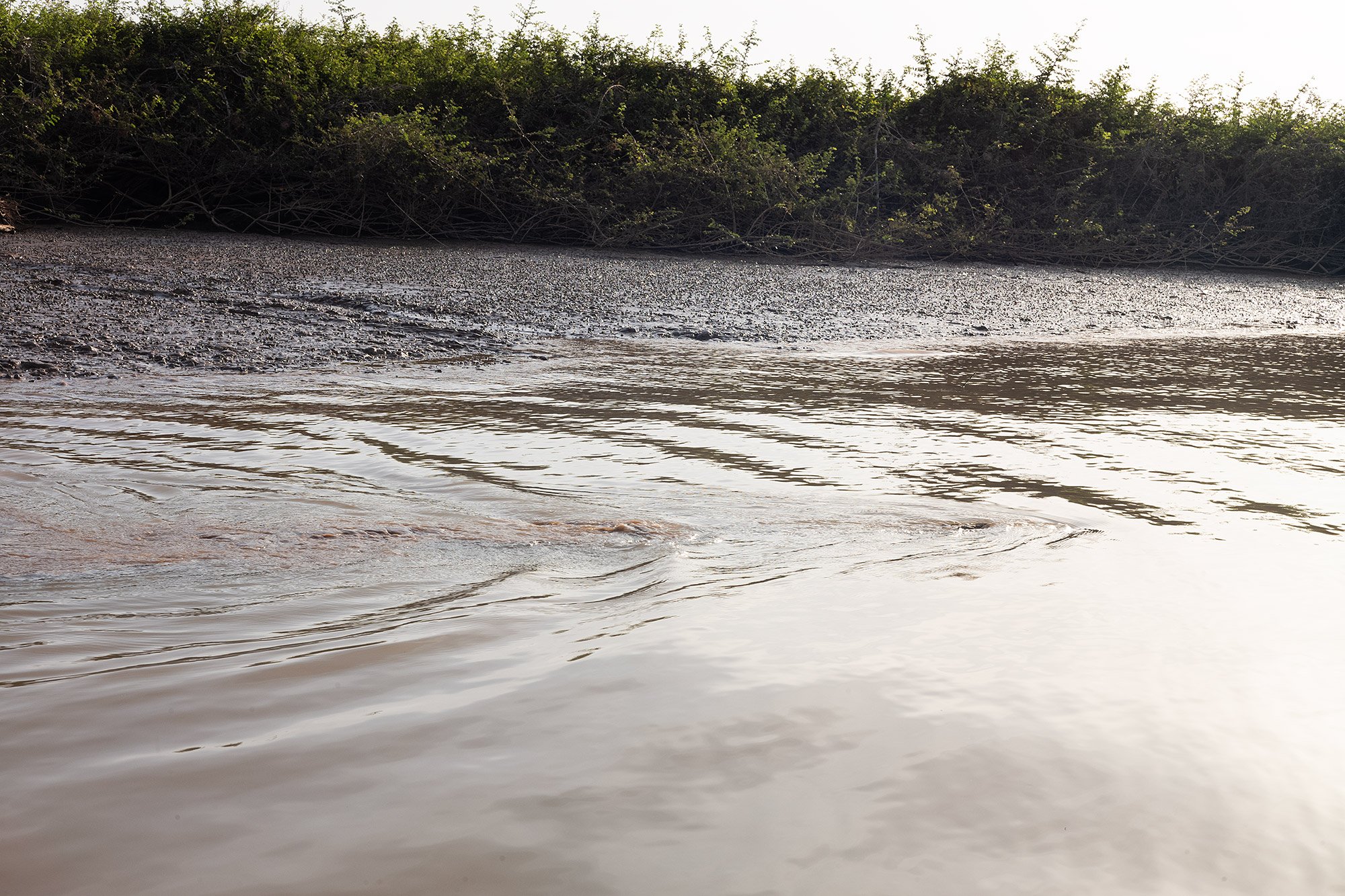
I admire the trees around us, their twisted branches and varied canopies. We see baboons, birds, and monkeys through the leaves. One set of trees looks like two people engaged in conversation, or one person pruning a wild overgrowth.

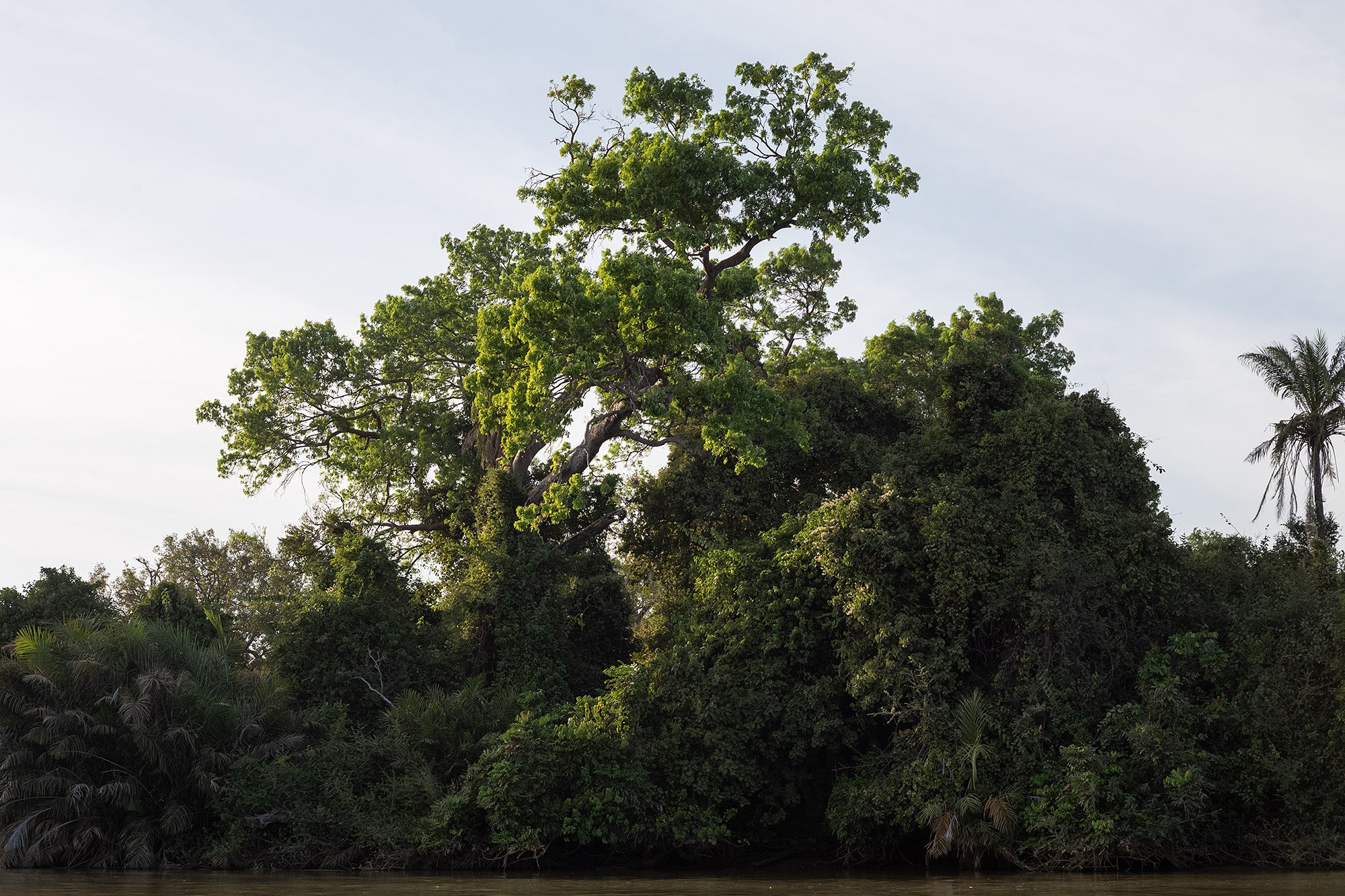

Heading back towards the camp, we pass a ridge where it’s said the last elephant in The Gambia died. Tomorrow we’ve planned a hike up to the ridge near sunrise for the view.
Our guide points out the silhouettes of baboons on the ridge, which become clearer as we near. we can see them jump up and climb down, stroll along the edge of the cliff, bask in the late afternoon sun.
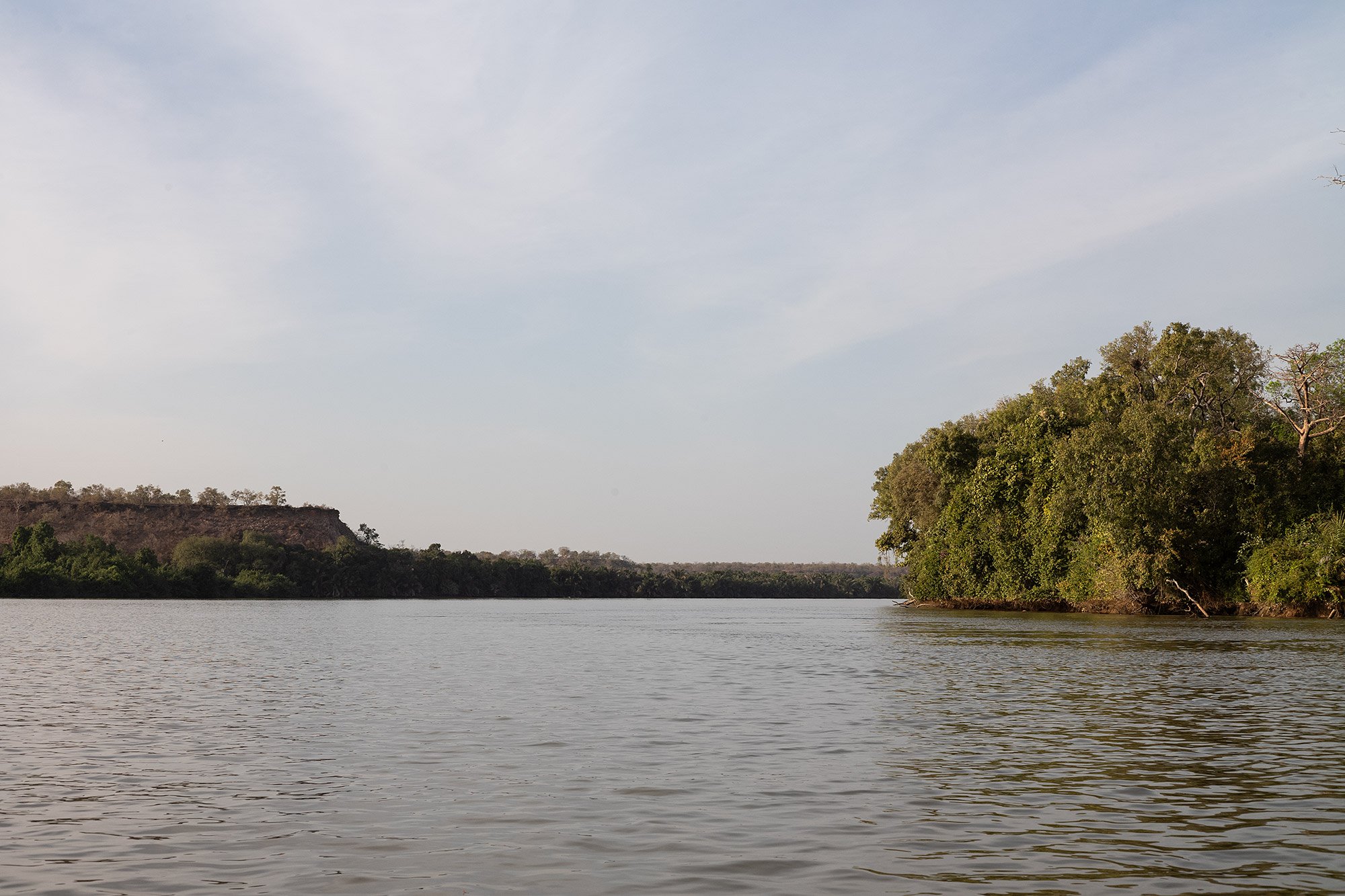


Back at the camp I chat with Janis on the deck as the sun sets. It’s a magical moment. We talk about books and politics, recommending things to each other to read, debate positions, lament the state of the world, celebrate the life ongoing around us.





For dinner we eat hummus and Italian vegetables with couscous by candlelight. We’re given solar-powered lamps to take with us back to our tents. I’ve arranged a bush baby walk and my guide meets me outside my tent. We see two, maybe three. Then we see bright one with orange and blue eyes not too far away. And then we spot one close by, walking in the trees. We’re lucky to have spotted so many, and one so close.
My guide has been married 15 years; they have three children. He wife is from a neighboring village, they met in school. He tells me that when he met his wife he told her he would one day marry her. She laughed. Her mother said he was a joker. But then one day he wasn’t joking anymore. The parents met, all went well, and here we are. She tells me he’s a good woman. They live together with his parents in a compound. Their village is about 3km from the camp; he commutes by motorbike.
I shower outside under the stars and then lie on one of the daybeds set up on my platform to stare at the stars. I see a shooting star and wait in hopes of more. I want to sleep outside, but the mosquitos get the best of me and I retire. From a nearby village techno music plays us into the night. 🇬🇲
